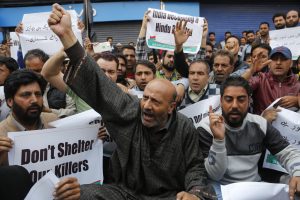Parliamentary election results from the Indian Union Territory (UT) of Jammu and Kashmir (J&K) underscore the persisting political divide between the Jammu region and the Kashmir valley as well as the massive public sentiment against the Bharatiya Janata Party (BJP).
The BJP won from both constituencies — Jammu and Udhampur — in the Hindu-majority Jammu region, a traditional stronghold of the Hindu nationalist party.
Anticipating rejection by voters, the BJP had refrained from contesting in the valley.
However, it had backed “proxies” — the People’s Conference, Apni Party and the Democratic Progressive Azad Party in the just-concluded general elections.
The BJP’s proxies performed poorly. Not a single candidate from these parties won. Indeed, they did so badly that they lost their security deposits as they failed to secure a minimum of one-sixth of the total valid votes polled in their respective constituencies.
Of the three constituencies in the Kashmir valley, the National Conference (NC) won two — Srinagar and Anantnag-Rajouri — with the third seat, Baramulla, going to a jailed independent candidate, ‘Engineer Rashid.’
Kashmiri voters rejected the scions of two prominent rival political dynasties: former chief ministers Omar Abdullah of the National Conference and Mehbooba Mufti of the People’s Democratic Party.
The results are expected to impact Kashmir’s politics significantly.
This was the first general election in J&K since August 2019, when the Narendra Modi government abrogated Article 370 of the Indian constitution to revoke J&K’s autonomy. Additionally, the state of J&K was split into two union territories — J&K and Ladakh.
While the Jammu region celebrated the revocation of J&K’s autonomy, the Kashmir valley was strongly opposed to it.
Anticipating protests, the Modi government jailed political leaders and activists, cracked down severely on separatists, shut down the Internet for months on end, and silenced the media by arresting and using anti-terror laws against scores of activists and journalists.
The recent general election was the first test of the mood of the Kashmiri public since the abrogation of Article 370.
The election saw enthusiastic participation of political parties and voters in the campaigning and voting process; voter turnout in the three parliamentary seats in the valley was an unprecedented 50.86 percent, the highest in three decades.
In a post on X, formerly Twitter, Home Minister Amit Shah claimed that “through the surge in the poll percentage, the people of J&K have given a befitting reply to those who opposed the abrogation [of Article 370] and are still advocating its restoration.” A BJP politician wrote that the turnout “reflects a collective yearning for progress, stability, and prosperity under the leadership of Prime Minister Narendra Modi.”
Others pointed out that the unprecedented turnout of Kashmiri voters “is largely driven by the desire to demonstrate to New Delhi that they have not accepted the abrogation of Article 370,” and that “Kashmiris want to use the ballot box to express their anger against the Bharatiya Janata Party. Even the separatists have not called for a boycott of elections this time.”
The election results reiterate and reflect Kashmiri anger against the BJP’s unilateral decision to revoke J&K’s autonomy and its brutal silencing of their voices.
The BJP had resorted to every trick in the book to weaken the NC and the PDP, which had opposed its revocation decision. The two parties were part of the People’s Alliance on Gupkar Declaration (PAGD), a coalition of mainstream parties, and subsequently, both parties joined the opposition INDIA bloc. However, the NC and PDP fell apart over seat sharing in the general elections in Kashmir.
The election results show that the BJP government’s efforts to weaken the NC and PDP worked only with the PDP. The PDP lost all the seats it contested.
The NC performed well, although Abdullah’s defeat from Baramulla was a huge blow to the party.
The big news from Kashmir was the spectacular victory of Sheikh Abdul Rashid aka “Engineer Rashid” from Baramulla. Although he is a long-time supporter of Kashmiri separatism, Rashid contested elections and is a two-time legislator in the J&K State Assembly.
Rashid has been in jail since August 2019 in a terror-funding case, fought the recent elections from jail, and defeated Abdullah, a formidable candidate, by over 204,142 votes.
His victory in the recent general election “demonstrates that Kashmiri secessionism, cowed and leaderless since 2019, is far from spent,” writes Praveen Swami in The Print.
Rashid’s victory will provide a boost to Kashmiri secessionists. Will Kashmir’s political separatists throw their hats in the electoral ring?
In a few months, J&K will vote in long-overdue assembly elections. Political parties in J&K and New Delhi will look to the general election results to craft their strategies.
Already, the banned Jamaat-e-Islami, which has been engaged in back-channel talks with New Delhi for over a year, has expressed willingness to contest in the upcoming assembly elections if the ban on them is lifted. The Islamist organization’s activists were reportedly seen voting in all three constituencies in Kashmir.
While a resurgent NC can be expected to do well, it will have to contend with Islamists and separatists, who could run as independent candidates or under the banner of new parties.
All eyes will be on the BJP. Will it dare to contest? Or will it prefer to hide behind its proxies?

































